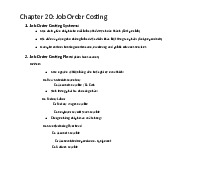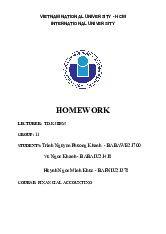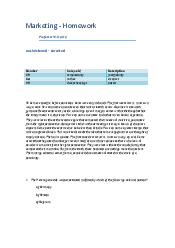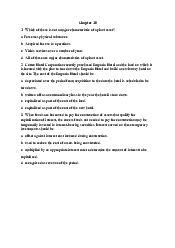








Preview text:
Vietnam National University – HCMC International University
SCHOOL OF BUSINESS ADMINISTRATION COURSE SYLLABUS1 BA005IU Financial Accounting
Note: The outline with specific venue and time, and updated learning
materials for the current semester will be provided to the enrolled students by the lecturer 1. COURSE STAFF
Lecturer: Ms. Truong Dieu Khiem Room: O1. 307 E-mail: tdkhiem@hcmiu.edu.vn
Teaching Assistant: E-mail:
Should the students wish to meet the staff outside the consultation hours, they are advised
to make appointment in advance (via email) 2. COURSE INFORMATION
2.1 Teaching times and Locations Time
Room Tuesday 8:00 – 10:30 A1.401 Tuesday 13:15-15:30 A1.309
Wednesday 10:30-13:00 A1.309 Saturday 8:00- 10:30 A2.301 2.2 Units of Credit
This course is worth 3 credits.
2.3 Parallel teaching in the course
There is no parallel teaching involved in this course.
2.4 Relationship of this course to others
BA005IU– Financial Accounting is the entry-level course which explores the basis of
accounting that would be beneficial to student seeking a degree in the business area.
Students will be introduced to the importance of accounting within the business
environment and how accounting information can be utilized to facilitate business
decisions. Students who decide to choose the Accounting and Finance major may go on to
take the course Managerial Accounting or Auditing in the following semesters, which will
focuses on evaluating and auditing firms, and report information to stakeholders.
2.5 Approach to learning and teaching
The lecturer will utilize the following methods of instruction: lecture, on-class tutorial, end-
of-chapter activities, and self-study. Students are also encouraged to seek assistance outside
class from the lecturer / tutor or through group tutoring.
It is noted that the course materials, including the handouts and tutorial notes, will be
uploaded in Blackboard to help the students to preview the materials and to concentrate on
listening and critical thinking.
3. COURSE AIMS AND OUTCOMES 3.1 Course Aims
This course develops a basic understanding on the theories, principles, and applications of
accounting and financial reporting, essentials in the IFRS standard, including topics such
as the theory of debit and credit, accounts, special journals, the accounting cycle, notes and
interest, accruals and deferrals, cash, receivables, inventory, fixed assets, and the analysis
of financial statements. In general, its primary aim is to provide the basic knowledge in
preparing and processing accounting transactions in order to present financial details in a
relevant and effective manner, as well as interpreting these accounting information for
different types of external and internal investors, management and other accounting information users.
3.2 Student Learning Outcomes
By the end of this course student should be able to:
- Identify the importance of accounting information in decision making and the role
it plays within the business environment
- Appreciate, understand and demonstrate the relevant procedures of the accounting
information life cycle and transformation of accounting information during this process, and
- Comprehend the development of accounting principles and policies through
accounting theories and undertakings of the accounting professions
In generic terms, students completing this course are likely to achieve the following attributes:
• In-depth knowledge of the field of the study: A comprehensive and well-founded
knowledge of the field of the study. All of the course objectives combined with lead
to a comprehensive introduction to the field of accounting.
• Effective communication: The ability to collect, analyze and organize information
and to convey those information clearly and fluently, in both written and spoken forms.
• Critical judgment: The ability to define and analyze problems, as well as to
evaluate statements information, make decisions and reflect critically on the justification for decisions.
3.3 Teaching Strategies
The learning system in this course consists of lectures and scheduled tutorials. Lectures
elaborate the appropriate theoretical content in the textbook and provide a more detailed
and refined analysis of both concepts and applied materials. Students are expected to read
prior to lecture attendance in order to gain maximum benefit from lectures. This
applies to all of your university studies. Coming in ‘cold’ to lectures without some prior
reading makes note-taking that much more difficult. Be aware that you may have to skim
some of these for additional information. In fact a ‘skim read’ before lectures is most appropriate and valuable.
From the third week, a three-hour tutorial will be offered every 2 weeks and will cover
selected tutorial questions and homework.
4. STUDENT RESPONSIBILITIES AND CONDUCT 4.1 Workload
It is expected that the students will spend at least nine hours per week studying this course.
This time should be made up of reading, working on exercises and problems, and attending
classes. In periods where they need to complete assignments or prepare for examinations, the workload may be greater.
Over-commitment has been a cause of failure for many students. They should take the
required workload into account when planning how to balance study with part-time jobs and other activities. 4.2 Attendance
Regular and punctual attendance at lectures is expected in this course. University
regulations indicate that if students attend less than eighty per cent of scheduled classes
they may be refused final assessment. Exemptions may only be made on medical grounds. 5. LEARNING ASSESSMENT
5.1 Formal Requirements
In order to pass this course, the students must:
• achieve a composite mark of at least 50; and
• make a satisfactory attempt at all assessment tasks (see below). 5.2 Assessment Details Mid-Term Exam 30% Homework & Quiz 30% Final Exam 40% Total 100% Assessment Rationale
Quiz & Homework: Student is required do homework on every class date. Quizzes will
be conducted after lectures without advanced notice.
Examination: Mid-term and final tests will be a combination of MCQ, short answer
questions, and application problems.
Programmable calculators will not be allowed for use during the exam. The use of
programmable calculator will result in receiving a zero for the exam.
The examination schedule and room will be announced by the Office of Academic Affair.
Any issues regarding the administration of, timetabling of and non-attendance at final
examinations need to be directed to the Office of Academic Affair. These issues are not
the responsibility of the individual lecturer.
Others: Students will not be allowed to attend the final exam if result of either homework
or mid-term exam is zero mark.
5.3 Class participation and Presentation
A minimum attendance of 80 percent is compulsory. Students will be assessed on the basis
of class attendance and participation
5.6 Special Consideration
Request for special consideration (for final examination only) must be made to the Office
of Academic Affairs within one week after the examination. General policy and information
on special consideration can be found at the Office of Academic Affairs.
6. ACADEMIC HONESTY AND PLAGIARISM
Plagiarism is the presentation of the thoughts or work of another as one’s own (definition
proposed by the University of Newcastle). Students are also reminded that careful time
management is an important part of study and one of the identified causes of plagiarism is
poor time management. Students should allow sufficient time for research, drafting, and
the proper referencing of sources in preparing all assessment items. The university regards
plagiarism as a form of academic misconduct, and has very strict rules regarding plagiarism. 7. STUDENT RESOURCES 7.1 Course Resources Textbook:
Jerry J Weygandt, Paul D Kimmel, Donald E Kieso, Accounting Principles IFRS Version, Global Edition Reference Books:
Carl Warren, Accounting With IFRS Essentials: An Asia Edition, 1st Edition Additional materials
The lecturer will attempt to make lecture notes and additional reading available on
Blackboard. However this is not an automatic entitlement for students doing this subject.
Note that this is not a distance learning course, and you are expected to attend lectures and
take notes. This way, you will get the additional benefit of class interaction and demonstration. Recommended Internet sites N/A Recommended Journals N/A
7.2 Other Resources, Support and Information
Additional learning assistance is available for students in this course and will be made
available in Blackboard. Academic journal articles are available through
connections via the VNU - Central Library. Recommended articles will be duly informed to the students. 8. COURSE SCHEDULE
The following is the outline that sets topics for the course. The instructor reserves the right
to revise this outline throughout the semester to either add or delete material as necessary
to accomplish the goals of the course. WEEK TOPICS CONTENTS
Lecture 1: Introduction to Accounting and Business 1
- The Nature of Accounting and Business Ch 1 - Accounting Equation - Financial Statements
Lecture 2: Analyzing Transactions 2
- Double-entry Accounting System Ch 2
- Journalizing Entries and Posting Them to Accounts - Trial Balance 3
Lecture 3: The Adjusting Process - Ch 3 Adjusting entries - Adjusted Trial Balance
Lecture 4: Completing the Accounting Cycle 4
- Flow of Accounting Information Ch 4 - Closing Entries - Accounting Cycle 5
Lecture 5: Accounting for Merchandising Businesses - Ch 5
Financial Statements for a Merchandising Business - Merchandising Transactions Lecture 6: Inventories 6 - Inventory Costing Methods Ch 6
- Reporting Merchandising Inventory in the Financial Statements - Estimating Inventory Cost 7 Revision session 8 Revision session 9 Midterm 10 Lecture 7: Receivables - Ch 9
Direct write-off method for Uncollectible Accounts
- Allowance Method for Uncollectible Accounts 11 Lecture 8: Fixed Assets - Ch 10 Plant Asset Expenditures - Depreciation Methods 12 Lecture 8: Fixed Assets - Ch 10 Plant Asset Disposals
- Statement preparation and Analysis 13
Lecture 9: Current liabilities - Ch 11 Accounting for liabilities - Reporting and Analyzing 14
Lecture 10: Financial Analysis Ch 18
- Basics of Financial Statement Analysis 15 Review 16 Review Final
1The syllabus is prepared following the format provided by the School of Organisation and Management, University
of New South Wales, with kind permission.



